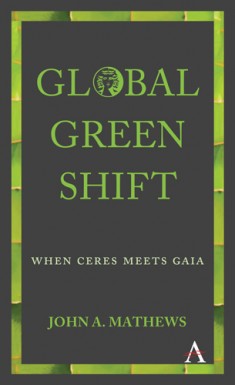- About This Book
- Reviews
- Author Information
- Series
- Table of Contents
- Links
- Podcasts
About This Book
Western industrialism has achieved miracles, promoting unprecedented levels of prosperity and raising millions around the world out of poverty. Industrial capitalism is now diffusing throughout the East. Japan, the four Tigers (Korea, Taiwan, Singapore and Hong Kong) and China are all incorporating themselves into the global industrial world. India, Brazil and many others are expected to follow the same course. But as China, India and other industrializing giants grow, they confront an inconvenient truth: they cannot rely on the Western industrial development model of fossil-fueled energy systems (resource throughput rather than circularity and generic finance) because these methods cause extreme spoliation of the environment and raise energy security, resource security and global warming concerns.
By necessity, a new approach to environmentally conscious development is already emerging in the East, with China leading the way in building a green industry at scale. As opposed to Western zero-growth advocates and free-market environmentalists, it can be argued that a more sustainable capitalism is being developed in China – to counter black developmental model based on coal. This new ‘green growth’ model of development, being perfected in China and now being emulated in India, Brazil, South Africa (and eventually by industrializing countries elsewhere), as well as by advanced industrial countries such as Germany, looks to become the new norm in the twenty-first century. Its core advantages are the energy security and resource security that are generated.
The British scientist James Lovelock has done the world an enormous service by formulating the theory of a ‘living earth’ named Gaia, where life self-regulates itself and the planet by keeping the atmospheric environment more or less constant, and likewise the environment of the oceans. In China’s Green Shift, Global Green Shift, Mathews proposes a way in which Gaia (a product of the processes of the earth) can be complemented by Ceres (our own creation of a renewable energy and circular economy system). Can these two concepts of how the earth works, represented by two powerful deities, be reconciled? While Lovelock is pessimistic, asserting that Gaia will look after herself and that if we survive at all it is likely to be as a greatly diminished industrial civilization, numbering no more than one billion people, Mathews argues in this book why he believes this prognosis to be mistaken. Mathews maintains that the changes that ‘we’ are driving, as a species, represent a viable way forward. They give us a chance of reconciling economy with ecology – or Ceres with Gaia.
Reviews
"The speed and volume of Far-Eastern – especially Chinese – innovation in business and technology have left Western economies reeling. Western scholars of innovation have also been struggling to keep up. An outstanding exception amongst these is the author of this book, John A. Mathews, of Macquarie University in Australia, which has already been recognised, first as the source of two articles in Nature, and more recently by the award of the prize offered by the international Joseph Schumpeter society for the best book on economic innovation." — William Kingston, Prometheus Journal, http://www.prometheusjournal.co.uk/wp-content/uploads/2020/10/Kingston-review-of-Mathews-ed-August-2020-final-Google-Docs.pdf
‘John Mathews is one of the foremost political economists examining, perhaps, the central question of our time, whether, we, as a species, can devise responses to global climate change. In this book, he argues that new green technologies are already available to allow us to begin manufacturing energy and thus overcome our addiction to fossil fuels – and he argues that it is China that is leading the way in the transition.’ –Martin Kenney, Professor, Community and Regional Development, University of California, USA
‘Asian countries are removing limits to their economic growth, using intelligence and manufacturing skills to let renewable energy replace polluting energy from finite sources. Clearly describing this revolution, Mathews helps readers in the other parts of the world understand how competitiveness for the future is now being created.’ –Tomas Kåberger, Professor, Energy Area of Advance, Chalmers University of Technology, Sweden
‘In this sweeping global analysis of environmental challenges, Mathews weds Schumpeterian and renewable energy insights to draw the bold conclusion that China and India have embarked on a course to lead the world toward sustainable solutions. The book documents China’s ecomodernization strategy, placing it in the vanguard of clean and renewable power.’ –Mark Selden, Professor Emeritus of Sociology, State University of New York at Binghamton, USA, and editor, The Asia-Pacific Journal
Author Information
John A. Mathews is a management strategy scholar who has influenced global policies on the greening of industry.
Series
Anthem Other Canon Economics
Table of Contents
List of Figures; Foreword by Dr Shi Zhengrong; Preface; List of Acronyms; Part I: Dynamics of the Green Transition; 1. Introduction; 2. Evolutionary Dynamics of Our Industrial Civilization; 3. Ecomodernization –with ‘Chinese Characteristics’; 4. Sociotechnical Transitions: A Sixth Wave; 5. No Wonder China and India Are Pursuing Green Growth Strategies So Vigorously; 6. Finance Now Playing a Central Role in the Green Shift; 7. Can the China Model Be Utilized by Other Industrializing Countries?; 8. Green Growth Development Strategies, Local Content Requirements and World Trade; 9. Farewell Fossil Fuels; Part II: Sixth Wave Eco- Innovations; 10. Global Population Peaking […] and Urbanizing; 11. Energy That Is Clean, Cheap, Abundant – and Safe; 12. Reframing Renewables as Enhancing Energy Security; 13. The Myths of ‘Renewistan’; 14. Recirculation and Regeneration of Resources (Circular Economy); 15. Food and Fresh Water Production; 16. Energy, Water, Food for Cities: Deploying a Positive Triple Nexus; 17. Eco- Cities of the Future; 18. When Ceres Meets Gaia; Bibliography; Index.
Links
● Winner of 2018 Schumpeter Prize Competition
● Global Green Shift - Author’s book webpage
Stay Updated
Information
Latest Tweets



